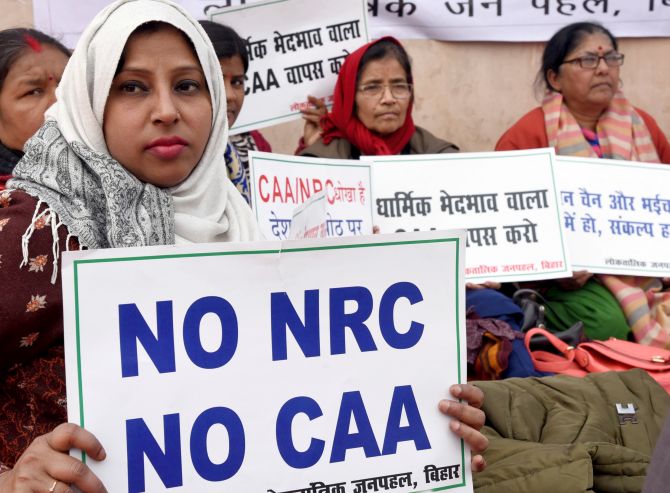 | « Back to article | Print this article |
Former Foreign Secretary Shivshankar Menon on Friday said the government's amendment to the Citizenship Act was a "self-inflicted goal" which has "isolated" India and resulted in the country being "hyphenated" with Pakistan as an "intolerant" state.

Speaking at a press conference in New Delhi where a number of academicians discussed the adverse implications of the contentious law which has led to nationwide protests, Menon said India has "gifted" its adversaries "platforms to attack us".
"What we have achieved in the recent past is to hyphenate our (India's) image with Pakistan in a fundamental way, which is an intolerant state," said the former National Security Adviser.
Responding to a question on whether these moves would affect India's foreign policy, Menon said, "In diplomacy, you don't have to tell the truth. So the calculation of the countries would be how they can promote their interests. They will not fight for your human rights. So, we have given them a platform to use, a lever, to pressure us to get what they want. This, I think, was unnecessary and a self-inflicted goal".
He said the perception of the country has changed after the controversial amendment to the citizenship law was passed.
"India has isolated itself through the move and the list of critical voices in the international community is also pretty long now. Perception of India has changed in the last few months. Even our friends have been taken aback," Menon said.
Referring to Bangladesh home minister Asaduzzaman Khan's response that "let them fight amongst themselves" when asked about CAA and NRC, Menon said, "If this is how our friends feel, think of how happy this will make our adversary".
He said the global opinion was on India's side when it assisted the formation of Bangladesh.
"What is happening now is quite another scenario. We are increasingly being isolated, we have no international support apart from a section of Indian diaspora and some extreme right Members of the European Parliament," he said.
Menon served as National Security Adviser under former Prime Minister Manmohan Singh.
He had previously served as Foreign Secretary in the ministry of external affairs.
He noted that several world leaders, including French President Emmanuel Macron, German Chancellor Angela Merkel and chiefs of United Nations bodies on human rights and refugees, were critical of the recent moves and referred to international conventions on human rights, civil and political rights as well as economic, social and cultural rights.
"What the world thinks matters more to us now than ever before. But we seem determined with actions like these (CAA) to cut off and isolate ourselves. That is no good to anybody," he said.
Expressing concern that India now seems to be in violation of international covenants, he said, "Those who think that international laws cannot be enforced, they must consider political and other consequences of being perceived as violators of international conventions".
Menon also referred to external affairs minister S Jaishankar's cancellation of a scheduled meeting with a United States congressional delegation over the presence of Indian American Congresswoman Pramila Jayapal, who has been critical of the Indian government.
"Rather than attending the meeting and putting forth India's views, we chose to duck," he said.
The United Nations Security Council discussed Kashmir for the first time in 40 years following the scrapping of special status to Jammu and Kashmir, Menon said.
He also expressed concern over the breaking of bipartisan consensus in the US on India with actions like Prime Minister Narendra Modi's 'Howdy Modi' event in Houston when he said 'Ab ki baar, Trump Sarkar'.
According to the CAA, non-Muslim refugees who came to India till December 31, 2014, to escape religious persecution in Pakistan, Bangladesh and Afghanistan will be given Indian citizenship.
Speaking at the event, another retired diplomat -- Deb Mukherji -- who served as India's ambassador to Bangladesh, said though it was true that Hindus have been persecuted, it was not to the extent that has been presented by the government.
He said certain prominent persons have also been suitably punished in that country for committing crimes against Hindus.
Others who spoke at the event at the Press Club were academicians included Zoya Hasan, Niraja Jayal and Faizan Mustafa among others.